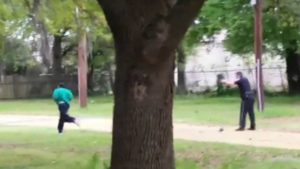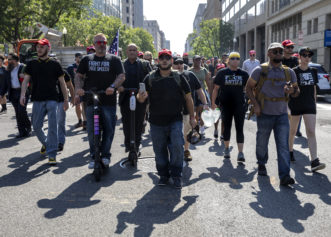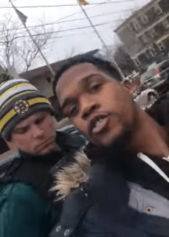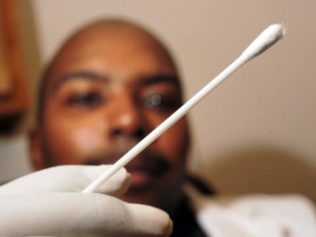
A screenshot of police video showing Walter Scott running from police moments before he was shot and killed.
After vacating the conviction of a Black man who fled police Tuesday, the highest court in the state of Massachusetts ruled that Black men who flee when approached by Boston police might have a legitimate reason for doing so.
According to Boston’s WBUR news, the Massachusetts Supreme Judicial Court cited Boston police data and a 2014 ACLU of Massachusetts report — which found that Black citizens were disproportionately targeted by the city’s police — in their decision to throw out the gun conviction of Jimmy Warren.
Police arrested Warren on Dec. 8, 2011 as they investigated a home break-in near Roxbury, Massachusetts, the new site reports. The officers had been given vague descriptions of the suspects, detailing them as three Black men — one sporting a red hoodie, one wearing a black hoodie, and the last donning “dark clothing.”
Per WBUR, Warren and another male, who both happened to be wearing dark clothing at the time, were spotted by police as they walked near a park. When officers approached the men, they took off running.
Officers eventually caught up with Warren and arrested him. According to the news site, no contraband was found on the Massachusetts man, but an unlicensed .22 caliber gun was recovered in a yard nearby. Warren was ultimately charged and convicted for unlawful possession of a firearm.
Fast forward five years, and the Massachusetts high court vacated his conviction on the basis that police had “far too little information” to stop Warren for a crime he was “suspected” to have committed. The justices also noted the lack of key physical characteristic descriptors, such as hairstyle, skin tone and height.
“…The victim’s description (of the suspects) contribute[d] nothing to the officers’ ability to distinguish the defendant from any other Black male’ wearing dark clothes and a ‘hoodie’ in Roxbury,” the unanimous opinion stated.
Rahasaan Hall of the ACLU of Massachusetts saw Warren’s case as nothing more than the all-too-common occurrence of racial profiling.
“He was a Black man in Roxbury,” Hall said. “That was essentially all that matched the description. And he had a hoodie.”
The justices went on to assert that when Black men flee the police, it doesn’t automatically mean they’re guilty of a crime. They also noted that the “pattern of racial profiling of Black males” in Boston should be considered as a reason for running.
“…Flight is not necessarily probative of a suspect’s state of mind or consciousness of guilt,” Justice Geraldine Hines wrote. “Rather, the finding that Black males in Boston are disproportionately and repeatedly targeted for FIO [Field Interrogation and Observation] encounters suggests a reason for flight totally unrelated to consciousness of guilt.”
“Such an individual, when approached by the police, might just as easily be motivated by the desire to avoid the recurring indignity of being racially profiled as by the desire to hide criminal activity,” she continued. “Given this reality for Black males in the city of Boston, a judge should, in appropriate cases, consider the report’s findings in weighing flight as a factor in the reasonable suspicion calculus.”
According to Boston ABC affiliate WCVB, Police Commissioner William Evans wasn’t too pleased with the high court’s ruling. Evans said he was dismayed with the justices’ heavy reliance on data from the “biased” ACLU report, which he described as “heavily tainted against police.”
The 2014 ACLU report, titled “Black, Brown and Targeted,” found that 63.3 percent of Boston police-civilian encounters targeted African-Americans, even though African-American citizens account for less than 25 percent of the city’s population. Regardless of crime prevalence, the report also noted that Boston police were more likely to initiate police encounters in Black communities and with Black people.
The justices also cited data from the Boston Police Department, which found that Black residents were 8 percent more likely to be stopped by police more than once and 12 percent more likely to be frisked and searched. Other factors like criminal history, gang membership, and violent crime areas were controlled for the in the analysis, according to the BPS official website.
Legal director of the ACLU of Massachusetts, Matthew Segal, expressed satisfaction with the ruling, noting the importance of the judicial court acknowledging issues concerning racially-biased policing.
“The state’s highest court, in talking about people of color, it’s saying that their lives matter and under the law, their views matter,” Segal said. “The reason that’s significant is that all the time in police-civilian encounters there are disputes about what is suspicious and what is not suspicious. So this is an opinion that looks at those encounters through the eyes of a black man who might justifiably be concerned that he will be the victim of profiling.”


